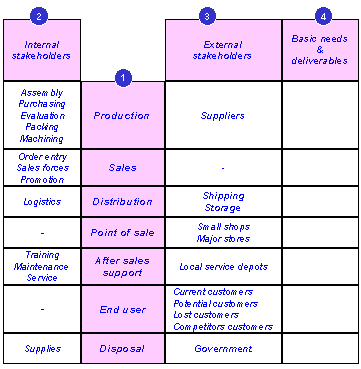Stakeholder analysis - lifecycle approach
It is often difficult to identify who the critical stakeholders are, particularly in complex distribution chains where the end user may not be the same person as the person who specifies the requirement or sighs the purchase requisition. Furthermore, there may be tensions between the needs of different sets of stakeholders. It is thus beneficial to formally consider the different groups and types of stakeholders who will be influenced by the product design, throughout the product's lifecycle.
This lifecycle approach is also a useful way of capturing issues which may be relevant several years after the product has been sold, but demand consideration early in the design process. This simple analysis helps to focus attention on the complete package of outputs which must be generated in order to produce a saleable and supportable product.
General approach
Stages in the product life cycle
What are the basic stages in the product lifecycle, in order to get the product from production to the customer? How many different people are involved in the transition? What happens to the product after use, when disposal is required?
Internal stakeholders
How many different internal stakeholders are affected at each stage? Who are they?
External stakeholders
How many different external stakeholders are affected at each stage? Who are they? External stakeholders are the critical group and the normal focus of user research.
Basic needs of each stakeholder
Is it possible to identify or quantify the basic needs of each different stakeholder? If not, then there may be the need for some research

For more information, please contact:
T: +44 1223 764830









